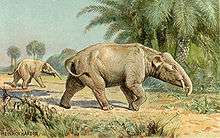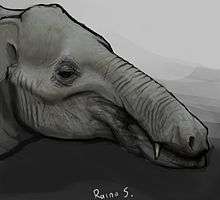Palaeomastodon
| Palaeomastodon Temporal range: Late Eocene–Early Oligocene | |
|---|---|
 | |
| P. beadnelli skull | |
| Scientific classification | |
| Kingdom: | Animalia |
| Phylum: | Chordata |
| Class: | Mammalia |
| Infraclass: | Eutheria |
| Superorder: | Afrotheria |
| Order: | Proboscidea Illiger, 1811 |
| Family: | †Palaeomastodontidae |
| Genus: | †Palaeomastodon |
Palaeomastodon an extinct genus of Proboscidea. Palaeomastodon fossils have been found in Africa, lived some 36-35 million years ago. They are believed to be the ancestors of elephants or mastodons. This genus is related to Moeritherium.[1]

Artistic representation by Heinrich Harder
Palaeomastodon had tusks, both upper and lower, and it had a trunk. It was 1 to 2 meters tall and weighed up to 2 tonnes. The lower tusks were flat rather than pointed cones, and were probably used to scoop plants from swampy water.

Artistic representation
Sources
- Chased By Sea Monsters by Nigel Marven and Jasper James (Pg.128)
Paleomastodon, http://www.elephant.se/palaeomastodon.php?open=Extinct%20Proboscidea
References
This article is issued from Wikipedia - version of the Wednesday, April 22, 2015. The text is available under the Creative Commons Attribution/Share Alike but additional terms may apply for the media files.